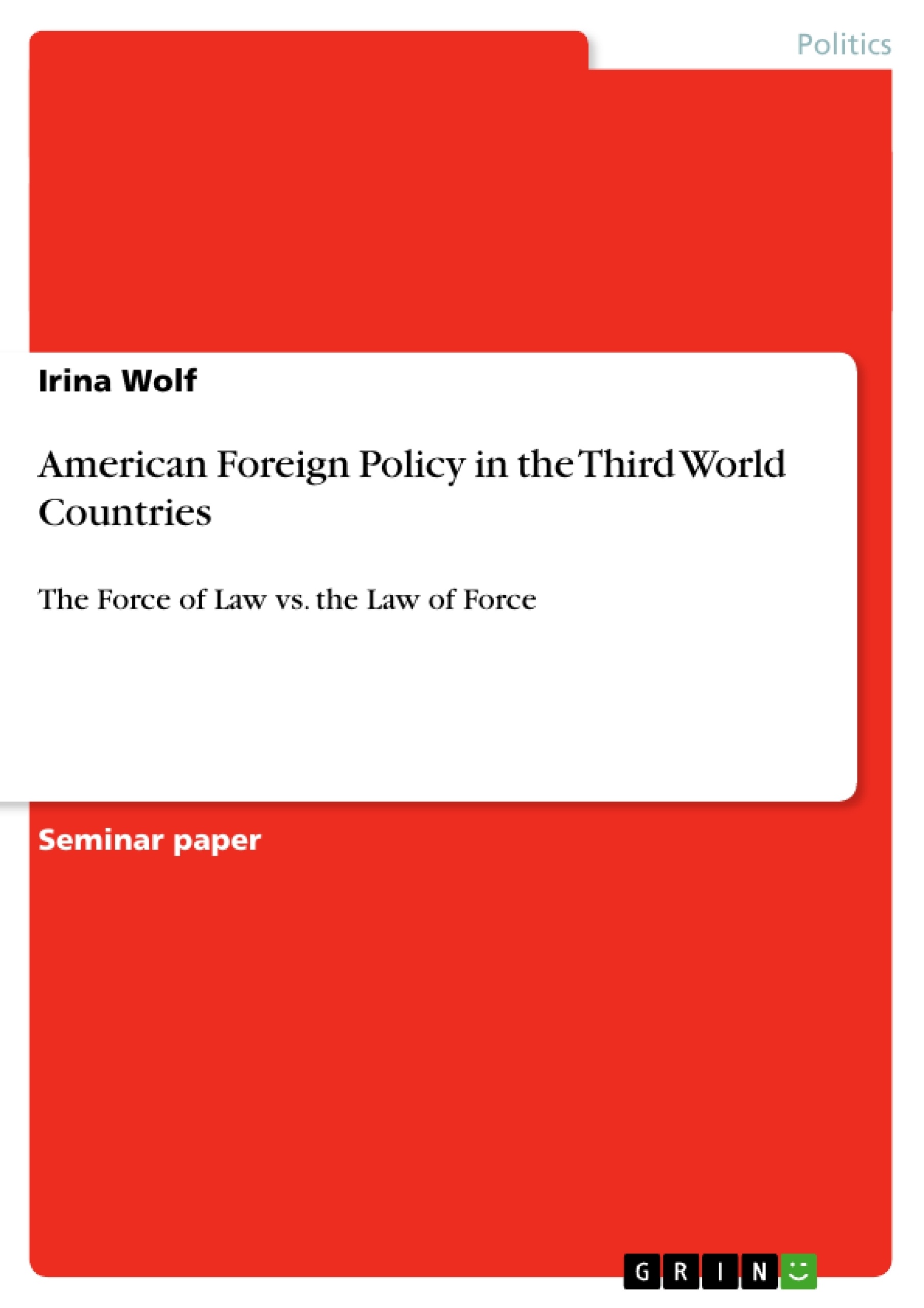This research focuses on the United States’ foreign policy in the Third World (meaning here not industrialized, mainly poor countries) and its use of words (internetional law and diplomacy) and deeds (coercive diplomacy and military intervention). The numerous historical examples reveal the treacherous nature of American Foreign Policy, because the USA prefers the law of force rather than the force of law for the sake of its own interests.
The examples of the invasion of Grenada, Libya, and Nicaragua support the argument that the USA is ready to use force and go against international law to pursue its own national interest. Contrary to its claims of being the fighter for democracy and human rights in the world, America does protect it only when it is convenient to it and when it can somehow benefit from spending money on the liberation operations. However, it is vital to keep in mind that being a rational player the USA invaded only militarily weak countries.
Inhaltsverzeichnis (Table of Contents)
- Introduction
- The Force of Law
- The Law of Force
- Conclusion
Zielsetzung und Themenschwerpunkte (Objectives and Key Themes)
This text examines the American foreign policy approach towards Third World countries, focusing on the tension between international law and the use of force. It aims to analyze how the United States navigates the complexities of promoting its national interests while simultaneously pursuing peace and stability on a global scale.
- The role of international law in shaping American foreign policy
- The use of force by the United States in the Third World
- The justifications for American military intervention
- The interplay between diplomacy and coercive diplomacy
- The historical context of American foreign policy in the Third World
Zusammenfassung der Kapitel (Chapter Summaries)
Introduction: This section provides a brief overview of the historical context surrounding American foreign policy, highlighting the evolution of conflict from interstate wars to intrastate conflicts and the emergence of international law as a framework for peaceful coexistence. The text explores the challenges faced by world leaders in balancing national interests with the pursuit of global peace and stability, particularly in the context of nuclear weapons and the Cold War.
The Force of Law: This chapter delves into the concept of international law, emphasizing the importance of the UN Charter and its Article 2(4) which prohibits the use of force in international relations. It analyzes how this article has been violated by various nations, highlighting the complexities of upholding international law in a world where power dynamics play a significant role. The chapter further examines historical examples, such as the invasion of Grenada in 1983, to illustrate how the United States has employed its military power to achieve its foreign policy objectives, often justifying its actions through various rationalizations.
The Law of Force: This chapter explores the concept of the law of force, drawing parallels to Darwin's theory of survival of the fittest. It argues that the use of force has been a long-standing feature of international relations, with the strongest nations often wielding their power to influence global events. The chapter analyzes the role of terrorism in justifying military interventions, using the examples of the bombing of Libya and the invasion of Afghanistan. It further examines how the United States has justified its actions, including the mining of Nicaraguan harbors and support for anti-communist rebels in Central America, by invoking the promotion of democracy and the fight against aggression.
Schlüsselwörter (Keywords)
This text focuses on key concepts such as American foreign policy, international law, the use of force, coercive diplomacy, Third World countries, nuclear weapons, Cold War, UN Charter, terrorism, democracy, and the historical context of American intervention in the Third World.
Frequently Asked Questions
How does US foreign policy approach the "Third World"?
The US often uses a combination of diplomacy and coercive measures, including military intervention, prioritizing national interests over international law in many historical instances.
What is the significance of UN Charter Article 2(4) in this context?
This article prohibits the use of force in international relations, yet the text argues it has been frequently violated by powerful nations to achieve foreign policy goals.
What historical examples of US intervention are discussed?
The text analyzes the invasion of Grenada (1983), the bombing of Libya, and military activities in Nicaragua as evidence of the US using force to protect its interests.
What is "coercive diplomacy"?
Coercive diplomacy is a strategy that uses the threat or limited use of force to persuade an opponent to stop or undo an action.
How does the US justify its military interventions?
Justifications often include the fight against terrorism, the promotion of democracy, and the protection of human rights, though the text critiques these as sometimes being selectively applied.
- Quote paper
- Irina Wolf (Author), 2005, American Foreign Policy in the Third World Countries, Munich, GRIN Verlag, https://www.grin.com/document/130060



